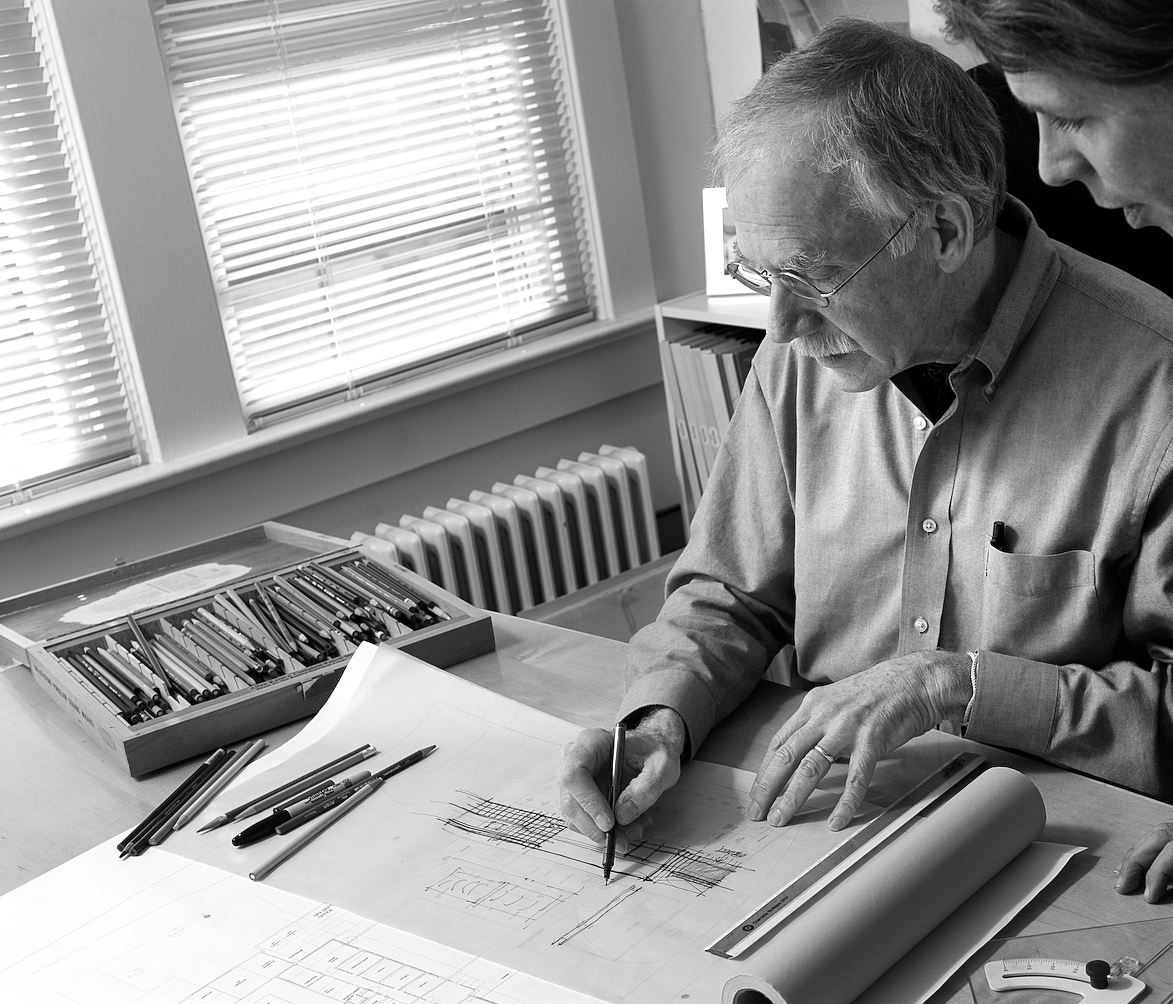KSS Architects co-founder Allan Kehrt, FAIA, LEED AP, PP will step down from his role as senior design partner to an emeritus position at the beginning of 2012 - a move that has been ongoing for more than 10 years as part of the firm's ownership transition plan.
Since establishing KSS Architects in 1983 with colleagues Michael Shatken and Rafael Sharon, Kehrt has helped the firm grow from a staff of three focused on residential design, into a 40-person company with offices in Princeton and Philadelphia. With the leadership of its six partners - Kehrt, Shatken, Edmund Klimek, Pamela Lucas Rew, David Zaiser, and Merilee Meacock - KSS has risen above recent economic challenges and developed an award-winning portfolio of projects across the nation in the markets of higher education, K-12 education, industrial, commercial, corporate interiors, municipal design and sustainable design.
"The past year was one of the strongest we have had in the market," Shatken said. "Allan shaped our core values about design excellence as well as client relationships, which all of the partners have instilled throughout the firm. As a result, our breadth of work and our national presence continue to grow."
"I will admit it's hard to back away from KSS after 28 years," added Kehrt. "But it's is something we have been planning for many years. I have absolute confidence that Michael and our next generation will continue to add to the exceptional achievements of KSS for many, many years. It's been a great ride!"
Kehrt's legacy of projects include Rutgers University's Biomedical Engineering Building, the renovation and expansion of Cornell University School of Hotel Administration, the recent new campus center at The Richard Stockton College of New Jersey and Princeton Township's Municipal Complex.
In 2001, Kehrt was elevated to the American Institute of Architects' College of Fellows, an honor bestowed to only 3 percent of all registered architects in the U.S. In 2008, Kehrt was nominated to the AIA's Jury of Fellows, a three-year post, and served as a chairman in 2010. Kehrt was also named Architect of the Year by AIA New Jersey in 2006.
Active in the design education community, Allan has served as faculty, guest lecturer, or juror at many colleges of architecture in the east, including the University of Pennsylvania, Philadelphia University, Moore College of Art & Design, New Jersey Institute of Technology and his alma mater Virginia Polytechnic Institute and State University, where he will continue on its Advisory Board. He has presented and lectured for many professional organizations including the American Institute of Architects and the Society of College and University Planning. BD+C
Related Stories
| Nov 15, 2010
Gilbane to acquire W.G. Mills, Inc.
Rhode Island-based Gilbane Building Company announced plans to acquire W.G. Mills, Inc., a construction management firm with operations based in Florida. The acquisition will dramatically strengthen Gilbane’s position in Florida’s growing market and complement its already established presence in the southeast.
| Nov 11, 2010
Saint-Gobain to make $80 million investment in SAGE Electrochromics
Saint-Gobain, one of the world’s largest glass and construction material manufacturers, is making a strategic equity investment in SAGE Electrochromics to make electronically tintable “dynamic glass” an affordable, mass-market product, ushering in a new era of energy-saving buildings.
| Nov 11, 2010
Saint-Gobain to make $80 million investment in SAGE Electrochromics
Saint-Gobain, one of the world’s largest glass and construction material manufacturers, is making a strategic equity investment in SAGE Electrochromics to make electronically tintable “dynamic glass” an affordable, mass-market product, ushering in a new era of energy-saving buildings.
| Nov 11, 2010
USGBC certifies more than 1 billion square feet of commercial space
This month, the total footprint of commercial projects certified under the U.S. Green Building Council’s LEED Green Building Rating System surpassed one billion square feet. Another six billion square feet of projects are registered and currently working toward LEED certification around the world. Since 2000, more than 36,000 commercial projects and 38,000 single-family homes have participated in LEED.
| Nov 10, 2010
$700 million plan to restore the National Mall
The National Mall—known as America’s front yard—is being targeted for a massive rehab and restoration that could cost as much as $700 million (it’s estimated that the Mall has $400 million in deferred maintenance alone). A few of the proposed projects: refurbishing the Grant Memorial, replacing the Capitol Reflecting Pool with a smaller pool or fountain, reconstructing the Constitution Gardens lake and constructing a multipurpose visitor center, and replacing the Sylvan Theater near the Washington Monument with a new multipurpose facility.
| Nov 9, 2010
Just how green is that college campus?
The College Sustainability Report Card 2011 evaluated colleges and universities in the U.S. and Canada with the 300 largest endowments—plus 22 others that asked to be included in the GreenReportCard.org study—on nine categories, including climate change, energy use, green building, and investment priorities. More than half (56%) earned a B or better, but 6% got a D. Can you guess which is the greenest of these: UC San Diego, Dickinson College, University of Calgary, and Dartmouth? Hint: The Red Devil has turned green.
| Nov 9, 2010
12 incredible objects being made with 3D printers today
BD+C has reported on how 3D printers are attracting the attention of AEC firms. Now you can see how other creative types are utilizing this fascinating printing technology. Among the printed items: King Tut’s remains, designer shoes, and the world’s smallest Rubik’s Cube.
| Nov 9, 2010
U.S. Army steps up requirements for greening building
Cool roofs, solar water heating, and advanced metering are among energy-efficiency elements that will have to be used in new permanent Army buildings in the U.S. and abroad starting in FY 2013. Designs for new construction and major renovations will incorporate sustainable design and development principles contained in ASHRAE 189.1.









